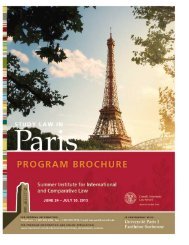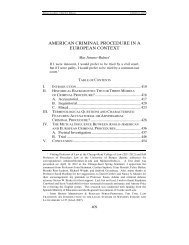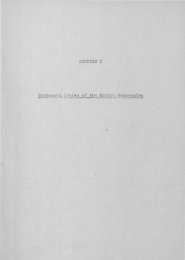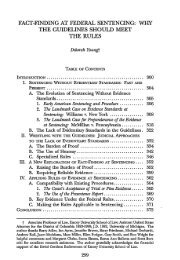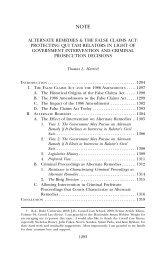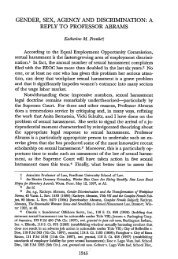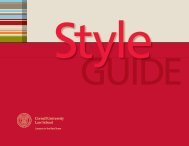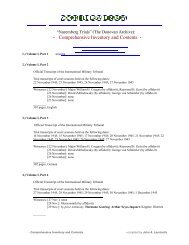JUDICIAL CLERKSHIP HANDBOOK - Cornell University Law School
JUDICIAL CLERKSHIP HANDBOOK - Cornell University Law School
JUDICIAL CLERKSHIP HANDBOOK - Cornell University Law School
Create successful ePaper yourself
Turn your PDF publications into a flip-book with our unique Google optimized e-Paper software.
Judicial Clerkship Committee for help.<br />
If you apply to judges whose chambers are geographically distant, you must make the<br />
necessary travel arrangements at your own expense. Consult the Financial Aid Office for<br />
information on <strong>Cornell</strong>=s interview loan fund. If you are offered an interview, call the other<br />
judges on that court to whom you applied and try diplomatically to arrange to meet with<br />
them while you are in the area. Or, if you travel to a distant city on other business and one<br />
of the judges to whom you applied has chambers there, you might call to ask whether the<br />
judge has begun to interview and, if so, whether he or she would like to see you. Some<br />
judges will conduct interviews by telephone with candidates who do not live nearby, and<br />
some judges are willing to conduct video interviews. The Office of Public Service has the<br />
necessary equipment and designated space for video interviewing. Contact Assistant Dean<br />
Karen Comstock or Elizabeth Peck for details. It is still the case that most judges will want to<br />
meet you in person.<br />
Interviews with judges do not follow the same somewhat typical format that you may have<br />
gotten used to in your interviews with other employers. You may speak only to the judge,<br />
or, as is more common, you may find yourself meeting with the judge=s current law clerks as<br />
well. Some judges focus on law‐related questions; some may Aquiz@ you (for instance,<br />
asking questions about recent Supreme Court decisions or requiring you to respond to a<br />
legal issue in writing); some spend a great deal of time assessing your Afit@, focusing on<br />
interesting and different non‐law related aspects of your background. In any case, you will<br />
be trying to convince an individual, not a group or institution, to hire you.<br />
Be prepared to discuss anything on your resume. For example, if you listed an<br />
undergraduate thesis, spend enough time refreshing your memory that you can talk<br />
intelligently and succinctly about it: this is no time to sound as if your undergraduate<br />
education is a foggy blur.<br />
Be prepared to discuss some legal issue substantively. The judge may want to see the<br />
quality of your thinking and interaction on legal issues; after all, that is a central part of the<br />
clerk=s role. If your resume shows you have completed a journal note, a moot court<br />
competition, or a clinical course, these are obvious possibilities for substantive discussion.<br />
Be sure you have the issues well in hand. (Obviously, if you submitted a writing sample, this<br />
is another likely source of substantive discussion.) You might also collect your thoughts on<br />
some issue that intrigued you in a course or seminar, or that was presented in a recent<br />
Supreme Court case. The bottom line is simple: If the judge wants to talk substance, you=d<br />
rather it be on a topic about which you have had some time to reflect.<br />
It is a good idea to educate yourself about the judge before you interview. In addition to<br />
what might be on Symplicity, other resources include the Almanac of the Federal Judiciary,<br />
the Leadership Directories’Judicial Yellow Book, and The American Bench, which contain<br />
some biographical data. Check Westlaw and Lexis for information on recent cases.<br />
22 | P age



